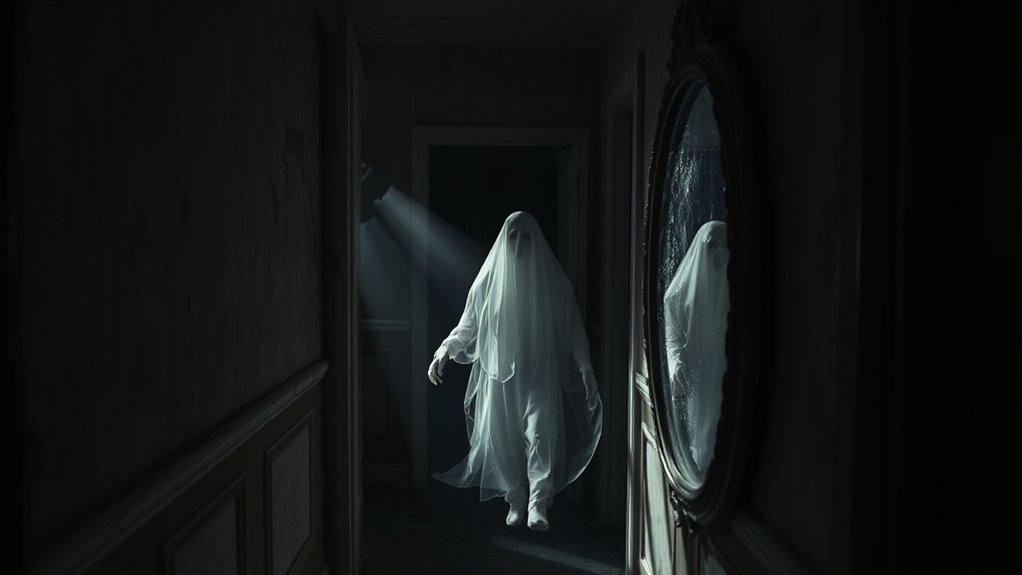Most reports show that ghosts rarely, if ever, cause physical harm. Fears of being hurt by spirits stem from folklore and misconceptions, not facts. Many ghostly encounters involve just feelings of unease, cold spots, or strange noises, which are usually harmless and temporary. Staying calm, respectful, and trusting your instincts can help you stay safe. If you want to understand more about how to distinguish fact from fear, keep exploring this subject.
Key Takeaways
- Physical harm from ghosts is extremely rare; most encounters involve psychological or environmental factors.
- Maintaining calm and respecting spirits can prevent escalation or negative interactions.
- Using protective symbols or rituals may help establish boundaries but do not guarantee safety.
- Fear is often based on folklore; rational understanding reduces anxiety about ghostly encounters.
- Most ghostly experiences are harmless and rooted in emotional or psychological states rather than physical threats.

Have ghosts ever hurt you? If so, you’re not alone in wondering whether those eerie experiences could pose real danger. Many people believe that ghostly encounters are harmless, just fleeting impressions or emotional disturbances, but some worry about the potential for harm. The truth is, understanding the risks involved with paranormal activity requires separating fact from fear. While some think ghosts can physically hurt you, most experts agree that such incidents are extremely rare, if they happen at all. Still, it’s wise to contemplate principles of paranormal safety when faced with unexplained phenomena. Knowing how to protect yourself during ghostly encounters can help you feel more in control and reduce anxiety about potential threats. First, it’s important to remember that most ghostly encounters don’t involve physical harm. Many reports describe feelings of unease, sudden cold spots, or strange noises, but these are typically attributed to psychological factors or environmental causes rather than malevolent spirits. That said, if you’re in a situation where you feel threatened, trust your instincts and remove yourself from the environment if possible. Keeping a clear head and practicing paranormal safety can prevent escalation of fear or stress. Some believe that spirits may become aggressive if they sense disrespect or disturbance, so approaching such situations with caution and respect can be helpful. Avoid provoking or challenging what you perceive as a ghost, and instead focus on creating a calm atmosphere. If you’re concerned about ghostly encounters, consider using protective symbols, prayers, or rituals that help establish boundaries. These practices may not guarantee safety but can provide reassurance and a sense of control. Education about hauntings and the nature of spirits can also diminish fear, helping you understand that most ghostly encounters are not harmful but rather emotional or psychological experiences. Remember, your mental state plays an essential role in how you interpret and respond to these events. Maintaining your composure and grounding yourself can often lessen the intensity of your experience. Additionally, understanding that most dream symbols are subjective and tied to personal feelings can help reduce unnecessary fear during unexplained events. Ultimately, the idea that ghosts can physically hurt you is largely rooted in folklore and fiction rather than fact. While it’s natural to feel afraid when faced with the unknown, approaching ghostly encounters with a rational mindset and respecting your own safety are the best ways to handle the situation. Most importantly, trust your instincts, seek help if necessary, and remember that, for the most part, ghosts are more likely to be harmless spirits than threats to your safety.
Frequently Asked Questions
Are There Scientific Explanations for Ghostly Encounters?
When you ask if there are scientific explanations for ghostly encounters, it’s important to contemplate quantum explanations and electromagnetic phenomena. Scientists suggest that some experiences may result from brain responses to electromagnetic fields or natural quantum effects, creating sensations of presence or movement. These explanations don’t confirm ghosts but offer plausible, scientific reasons for what people interpret as supernatural encounters. Your perception can be influenced by these natural, measurable forces.
Can Ghosts Cause Physical Injuries or Illnesses?
While the idea of paranormal energy causing physical injuries or illnesses sounds unsettling, there’s no scientific proof that spiritual entities can directly harm you. Most experiences attributed to ghosts are likely psychological or environmental. You might feel uneasy or experience subtle physical sensations, but actual harm from spirits remains unproven. Focus on understanding your feelings and surroundings, rather than fearing an impossible physical threat from spiritual entities.
What Cultural Beliefs Influence Fear of Ghosts?
You might find that cultural beliefs heavily influence your fear of ghosts. Cultural symbolism and folklore traditions shape how you perceive spirits, often associating them with danger or retribution. These stories and symbols can heighten your anxiety, making ghosts seem more threatening than they truly are. By understanding these influences, you can better separate fear from fact, recognizing that much of your fear stems from cultural narratives rather than actual harm.
How Do Mental Health Issues Relate to Ghost Fears?
Your fear of ghosts can often relate to mental health issues, where psychological triggers and cognitive biases play a role. You might interpret strange feelings or noises as supernatural, influenced by anxieties or past trauma. These mental health factors can amplify ghost fears, making them seem more real. Recognizing these triggers helps you differentiate between actual threats and fears rooted in psychological biases, allowing you to address them more effectively.
Are There Proven Methods to Protect Oneself From Ghosts?
You can practice spiritual protection by incorporating ritual practices like burning sage, using protective charms, or reciting affirmations. These methods help create a sense of safety and ward off negative energies. While scientific proof is lacking, many believe that consistent spiritual rituals can strengthen your sense of security and reduce fear. Trust your intuition, stay grounded, and explore protective practices that resonate with you to feel more at ease.
Conclusion
So, next time you feel that chilling presence or hear a whisper in the dark, remember: ghosts may not truly hurt you, but the fear they ignite can feel just as real. As shadows dance at the edge of your vision, ask yourself—are they just illusions or something more? The line between fact and fiction blurs in the quiet, and sometimes, it’s the unknown that leaves the deepest scars. Are you ready to face what lurks beyond?









